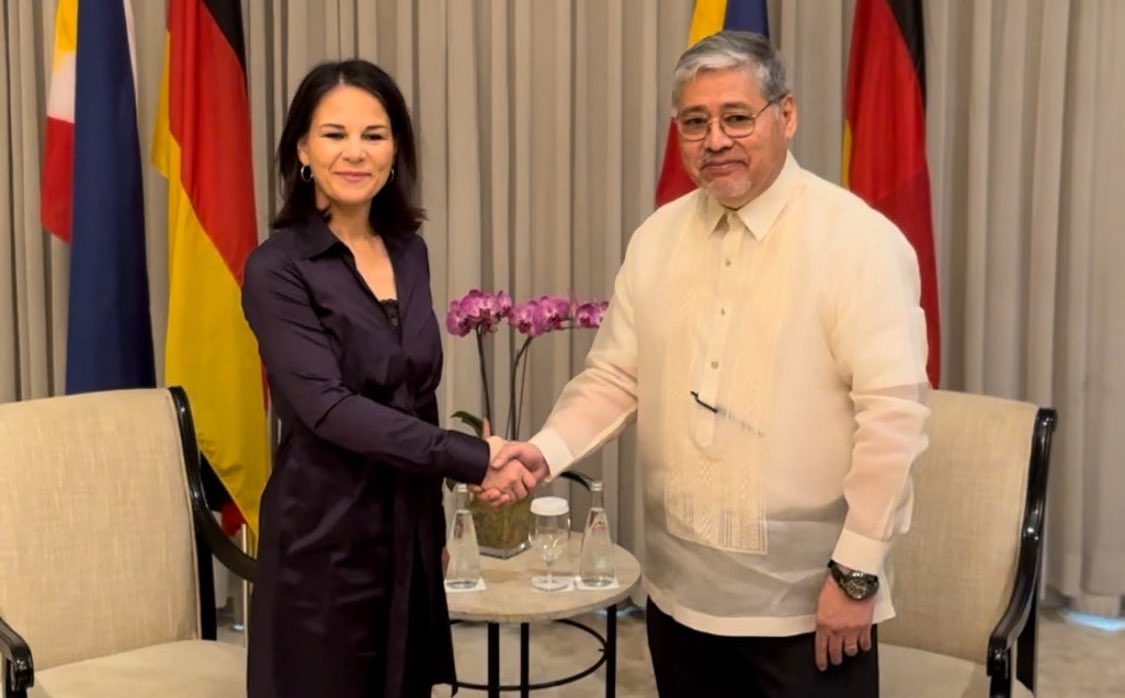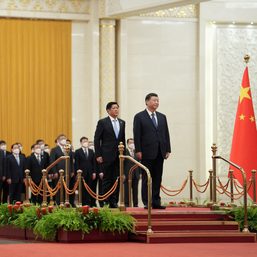SUMMARY
This is AI generated summarization, which may have errors. For context, always refer to the full article.

MANILA, Philippines – German Foreign Minister Annalena Baerbock on Thursday, January 11, warned of “rough winds blowing across the South China Sea,” following a bilateral meeting with Philippine Foreign Secretary Enrique Manalo in Manila.
Baerbock, fresh off a visit to the Middle East, including Israel, expressed concern over tensions in the vital waterway, a major global trade route. The German minister first reflected on the “risk that one more spark could set the whole region ablaze still exists,” referring to the Middle East.
“I am saying this because in your region, tensions are rising too. Rough winds [are] blowing across the South China Sea and this is happening in among the most [important] economic regions of the world,” Baerbock said in a joint press briefing with Manalo.
Baerbock said the China Coast Guard’s use of lasers and water cannons against Philippine vessels was a “concern” even for European countries because “such risky manuevers violate the rights and opportunities for economic development of your country and other states as well.”
She added that such actions “also call into question the freedom of navigation…in an area through which one-third of global maritime trade is shipped.”
Tensions between the Philippines and China continue to rise in the West Philippine Sea, Manila’s term for part of the South China Sea within the Philippines’ exclusive economic zone (EEZ),
Beijing claims practically all of the South China Sea, including parts of the West Philippine Sea, as its own – in defiance of international law and norms, including a 2016 arbitral ruling that quashed China’s nine-dash line claim. Germany is among the many countries that publicly supports the ruling that favored the Philippines.
Incidents of Chinese harassment – the use of lasers, water cannons, and “dangerous maneuvers” included – have become almost routine in some Philippine missions to the West Philippine Sea.
Confrontations between the two countries’ white ships have often happened in Ayungin Shoal, where a World War II-era ship serves as a Philippine outpost, and in Bajo de Masinloc, traditional fishing ground of fisherfolk from the Philippines, China, and Vietnam.
Both features are located well within the Philippines EEZ, or an area 200 meters from the Philippine coastline. Manila should have the exclusive right to exploit and protect natural resources within its EEZ.
Baerbock urged “mechanisms to solve tensions together in a peaceful way.”
“Germany will be happy to support this and help building trust, which is important and also will help prevent escalation in this way,” she added.
During her visit to Manila, the German official made a call on the Philippine Coast Guard (PCG) headquarters. Germany had donated drones to the PCG in 2022.
Baerbock said they will be offering “concrete training programs” for the PCG, among the frontline units that deal with China’s maritime harassment.
The PCG, responding to media inquiries, said Germany will be giving at least four more drones for use in their operations, including those in the West Philippine Sea. Help from Germany will also include “training on law enforcement, anti-piracy, and people-to-people exchanges,” said PCG Spokesperson Rear Admiral Armand Balilio.
Manalo said he his German counterpart spoke of “defense cooperation” and Germany’s support in the “capacity building of the PCG.” He added that a “key area” where Germany can best help the Philippines’ debacle in the South China is bringing “greater awareness in the international community and the importance of the rule of law in the region and the world as a whole.”
During her visit, Baerbock reiterated Germany’s support for ongoing negotiations for a free trade agreement between the European Union (EU) and the Philippines.
The German minister said the push for closer economic ties between her country, the EU, and the Philippines was fueled by “decisions that the Filipino government has taken so boldly,” including “changes” to former president Rodrigo Duterte’s bloody drug war, efforts to speak to rebel groups, and a “clear focus on human rights and rule of law and the free press.”
Manalo and Baerbock also tackled labor deals, with “specific focus on the placement of skilled Filipino workers and other professionals to live and work in Germany,” according to the Philippines’ Department of Foreign Affairs.
Baerbock is the first German Federal Minister for Foreign Affairs to visit Manila in over a decade. – Rappler.com
1 comment
How does this make you feel?







![[Just Saying] SONA 2024: Some disturbing points](https://www.rappler.com/tachyon/2024/07/TL-marcos-sona-points-july-23-2024.jpg?resize=257%2C257&crop=335px%2C0px%2C720px%2C720px)

Thanks to the encouraging words from German Foreign Minister Annalena Baerbock. Thanks also to President Marcos Jr. for the “bold decisions,” “changes,” and “focus, “which are the basis of such encouragement. I hope those decisions, changes, and focus will not change until the end of his term.